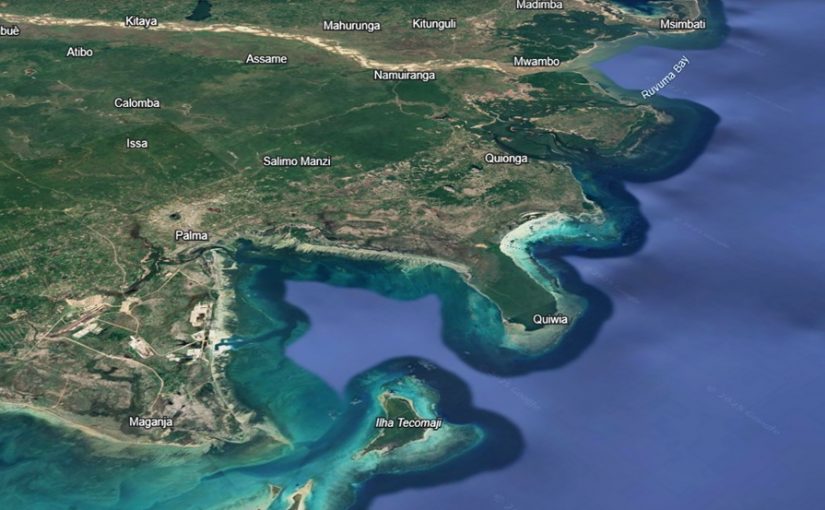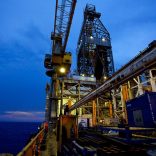Mozambique: Government aware of mining firms using ‘artisanal routes’ to circumvent Manica ...
Mozambique agrees to reinstatement of four-and-a-half-year force majeure period for TotalEnergies’ LNG concession – Lusa

Image: Google Earth
The Mozambican Government has agreed to reinstate the four-and-a-half-year suspension period during which the LNG megaproject in Cabo Delgado was under force majeure, contrary to the ten-year extension of the concession proposed by TotalEnergies, which cited losses caused by the halt.
A source close to the process told Lusa that the resolution, approved on Tuesday at the Council of Ministers’ meeting, establishes, “in line with applicable regulations, the reinstatement of the suspended period due to ‘force majeure’, ensuring the recalculation of the 30-year development term and preserving, under the law, the elements of the initial Development Plan.”
The Cabinet resolution also sets out the “need to assess all expenses incurred during the ‘force majeure’ period”, which TotalEnergies invoked due to terrorist attacks in Cabo Delgado from April 2021 to October 2025, leading to a four-and-a-half-year halt to the project, “with technical rigour and transparency, guaranteeing the protection of the public interest and contractual predictability through an independent audit, which includes the right to respond before the approval of the final report.”
The Government further decided to provide the institutional and executive support required to enable the orderly and efficient resumption of activities that will ensure the immediate restart of the project.
On 12 November, the Mozambican President said he expected to conclude negotiations with TotalEnergies within a week. The company had proposed extending the concession for ten years to compensate for losses of 4.5 billion dollars.
“If all goes well, in about a week at most we will conclude the discussions with the project led by Total, so that we can resume operations after the public announcement lifting the ‘force majeure’. Official communication has now been issued,” said the Head of State, Daniel Chapo.
“We are working to close the points we consider important, in order to benefit both the Mozambican people and the investors, so that the project can resume as quickly as possible,” he added, at the time.
READ: Mozambique to audit TotalEnergies’ cost claims over LNG project in Cabo Delgado
At issue are the conditions set by TotalEnergies in a letter delivered to the Mozambican Presidency on 24 October, notifying the decision to lift the project’s ‘force majeure’ clause, four and a half years after the suspension due to terrorist attacks in Cabo Delgado, while also pointing to the need for compensation for losses during the halt.
The concession extension proposed by TotalEnergies, leader of the Rovuma Basin Area 1 consortium, would, according to the letter seen by Lusa, serve to offset losses of 4.5 billion dollars (3.87 billion euros) for the suspension period.
In the letter signed by TotalEnergies’ president, Patrick Pouyanné, announcing the decision to lift the ‘force majeure’ clause, the request is justified as needed “to partially compensate for the economic impact” of the halt, due to terrorist attacks in Cabo Delgado, noting that security conditions for resumption are now in place, along with a revised budget.
““This revised budget’s approval shall cover the incremental costs incurred by the project due to the ‘Force Majeure,’ which amount to 4.5 billion dollars,” it adds.
The project in question is a 20-billion-dollar (17-billion-euro) megaproject. The concessionaire now indicates that the first delivery of LNG from the first train to be installed in Afungi, Cabo Delgado, has been pushed from July 2024, as originally planned, to the “first half of 2029”.
Mozambique has three approved megaprojects for developing LNG reserves in the Rovuma Basin, ranked among the world’s largest, off the coast of Cabo Delgado. These include the TotalEnergies project (13 mtpa), now preparing to restart after the suspension caused by terrorist attacks, and another by ExxonMobil (18 mtpa), worth 30 billion dollars (26.1 billion euros), which is awaiting a final investment decision, both located on the Afungi peninsula.
Added to these is the Italian company Eni’s project, which has been producing around seven mtpa since 2022 from the Coral Sul floating platform. Production will double from 2028 with the Coral Norte platform, in a 7.2-billion-dollar (6.2-billion-euro) investment.











Leave a Reply
Be the First to Comment!
You must be logged in to post a comment.
You must be logged in to post a comment.